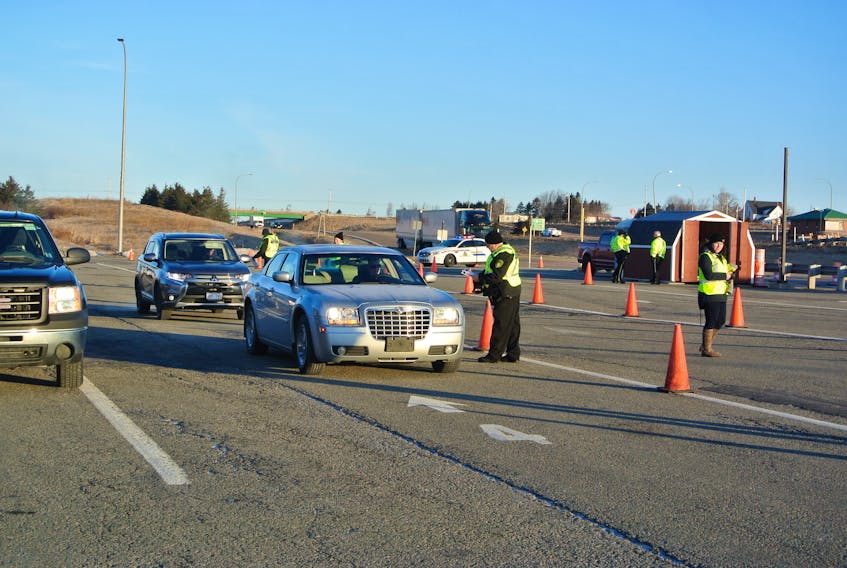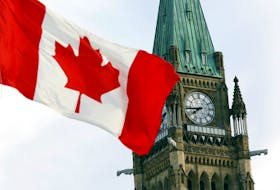AMHERST, N.S. – Crossing from Nova Scotia into New Brunswick is something many take for granted.
That is until times of emergency such as the current COVID-19 crisis that led the Nova Scotia government to declare a state of emergency in the province Sunday and place controls on traffic entering by highway, air and by sea.
“It’s not something I ever expected to see,” Amherst resident Andrew Wallis told the Amherst News. “Going to work, or coming home from work is something you can take for granted, but it’s understandable why the government is doing what it’s doing. It has to be done.”
Wallis works for the Correctional Service of Canada at its minimum-security institution in Dorchester.
He’s one of several dozen people living on the Nova Scotia side of the border who commute daily to jobs in New Brunswick, in Sackville, Dorchester, Moncton or Port Elgin. The same is true for people who live on the New Brunswick side, travelling to jobs in Amherst, Oxford, Springhill and elsewhere.
All that changed early Monday when Transportation and Infrastructure Renewal placed barricades at the Nova Scotia border, shutting off Exit 1 to the Nova Scotia Visitor Information Centre and directing all traffic into the inbound weigh station at Fort Lawrence, where motorists were questioned by provincial officials.
New day at the border
Anyone entering the province is being told to self-isolate for 14 days. Exemptions for cross-border travel include healthy workers in trades and transportation sectors who move goods and people, healthy people going to work and people travelling into the province for essential services.
Cpl. Jennifer Clarke of the RCMP said officers were at the border early Monday to assist provincial officials.
“Our current role is to assist provincial personnel as they set up the area in relation to the Province of Nova Scotia’s recent declaration of a state of emergency,” Clarke said in an email.
She does not believe this will impact enforcement elsewhere.
Wallis said he expects it will take extra time for him to get back and forth to work in Dorchester, but he’s prepared.
“I’ll have to prepare to go earlier knowing there will be lineups and checkpoints,” he said. He said he expects the New Brunswick border to be controlled as well. “There’s going to be a lot of uncertainty because no one really knows how this is going to go. There may be a situation where you can see your town but can’t get to it. Hopefully that doesn't happen. We’re sort of in unchartered territory.”
Wallis knows as an essential worker he won’t have an issue, but he said he will take extra things with him in case he can’t return or gets turned back.
Non-essential means no work access
Jay Burke, who has worked in Moncton for 14 years, went to his office Sunday night to collect what he needs to work from home.
He noticed quite a bit of traffic on the road Sunday night, more than he usually sees going back and forth to work every day.
“I wasn’t sure what was going to happen so I went up to Moncton to pick up what I could to work from home,” said Burke. “I’m set up in the dining room. I can do pretty much everything I need to do from home.”
Burke said he has previously worked from home during times of bad weather, but never because of a virus.
He understands the decision and supports it.
Michele LeBlanc is one of at least two dozen kidney patients who must travel to Moncton three to four times a week for life-saving dialysis. She was never concerned about being inconvenienced.
“There has always been good co-operation between New Brunswick and Nova Scotia and I’m glad to see the Nova Scotia government has made arrangements for those with medical appointments or for dialysis or chemotherapy,” she said.
She said she has a ticket she uses for parking in Moncton that she can use to show why she was in Moncton and she’s hoping the dialysis unit will provide a letter for her and other patients.
“It’s is life or death. We’re looking at 10 to 12 days if we don’t get our dialysis treatment,” she said. “We can miss one appointment, like on a Wednesday, but you have to have the others.”
She estimates there are at least 20 kidney patients travelling between the Amherst area and Moncton.
“The Nova Scotia government is doing a great job and I’m not concerned,” she said.
Her biggest concern is if New Brunswick begins running out of bed space as the impact of the virus increases. She is unsure where they will go for dialysis if that occurs.
Jillian Gallant normally travels across the border each day to work at a veterinary hospital in Sackville. She and a counterpart chose not to go to work Monday because they were uncertain whether they’d be able to get back home, or whether they’d be told to self-isolate.
For now, she said, their wages are being covered by their employer.
“We were confused with the border and our boss has isolated herself,” she said. “Right now, we’re getting paid our regular hours. We’ll wait and see what happens.”









